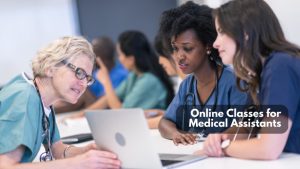In recent years, the passing rate in nursing exams countrywide has dropped from 88% to 82%, according to the NCSBN. Surprisingly, the fundamentals of nursing is among the tests many nursing students find difficult during their first year of nursing school. The nursing fundamentals exam 1 examines the core skills aspiring nurses need to excel in real healthcare workplace environments. In this post, our expert exam takers outline the questions tested in the nursing fundamental finals exam to help prospective nurses ace their upcoming test.
Nursing Fundamentals Final Exam Structure
Typically, the nursing fundamentals final exam consists of 50 multiple-choice questions that students must answer within the allocated timeframe. Each correctly answered question in the exam earns a point, which are then aggregated to form a final score converted into percentage.
During the exam, students get a total of 1 hour and 15 minutes to answer all the questions, with each question taking no longer than 90 seconds. Depending on the curriculum, students might also find short-answer questions in their final fundamentals exam that require written responses.
Tested Questions in Fundamentals of Nursing Final Exam
The fundamentals of the nursing final exam is taken at the end of the first semester of nursing school. Therefore, questions in the exam can come from any of the topics covered in the coursework during the academic year. The commonly tested sections in the exam include:
Nursing Process
The nursing process refers to the rational method of delivering healthcare services after nurses have initial contact with a patient. This section of the exam tests prospective nurses’ ability to provide holistic care in a professional and ethical way. The types of questions tested here include:
- Patient assessment: Questions on patient assessment ask students to identify the best tactics for evaluating patients and their health history. These include direct interviews with the patient or secondary assessments when patients are unresponsive. Students might also be asked to explain the immediate signs, such as skin and eye color, that can act as a source of the information about a patient.
- Diagnosis: Diagnosis questions ask students to identify the different conditions ailing patients in their care. Prospective nurses must be able to determine patients conditions based on the symptoms outlined in the North American Nursing Diagnosis Association (NANDA) and their medical history.
- Planning: Questions on planning ask students to explain the best steps to take to provide adequate treatment to patients based on the final diagnosis.
- Implementation: After planning the treatment process, questions ask students to implement the best treatment actions. This part of the exam involves outlining the required medical interventions, whether it’s surgery, oral, or topical drug administration, required to achieve health-related goals.
Communication Strategies
Strong communication is a significant part of providing competent healthcare. In this section, questions ask students to state the most effective strategies for explaining or elaborating medical findings to patients in an understandable way. Student nurses might also need to show their active listening skills and cross-communication abilities with other healthcare members of their team.
Patient Comfort and Safety
Another essential skill tested in the fundamentals of nursing exam is ensuring patient safety and comfort from initial contact until they’re out of the hospital. Questions on safety might test students’ knowledge of basic safety concepts, such as how to position patients during examinations or treatments. Besides that, students might also need to identify the various protective equipment like gloves, goggles, or masks needed in different health settings. Some examinations also test students’ understanding of the principles of a safe and healthy environment. as outlined in the American Nurses Association Nurses Bill of Rights.
Drug Administration
After diagnosing patient symptoms, nurses must administer or recommend the correct medications to patients. This part of the exam requires nursing students to explain the types of medication orders, including routine medications, single or one-time medications, and STAT, or immediate emergency medications.
On top of this, aspiring nurses might need to identify the best methods to administer the various medications, whether it’s oral, topical, and parenteral (injections) drugs. Students might also be examined on the keys to correct drug administration and ways to prevent adverse reactions in patients with allergies or other healthcare limitations.
Hygiene and Infection Control
Both nurses and patients are at risk of exposure to different infections and communicable diseases. As such, this part of the nursing fundamentals final exam assesses nurses’ ability to identify pathogens that can put themselves and other patients at risk and the paths these microorganisms use to enter the body. Finally, they must be able to recognize infections early and prevent the spread of the pathogens causing the infections.
What it Takes to Pass the Fundamentals of Nursing Final Exam
There is no secret or shortcut to passing the fundamentals of nursing. Students must prepare for the exam adequately and have the right mindset while taking the test. Our fundamentals of nursing exam experts can help students with the revision process and take the exam for students who feel unprepared even after revising.



